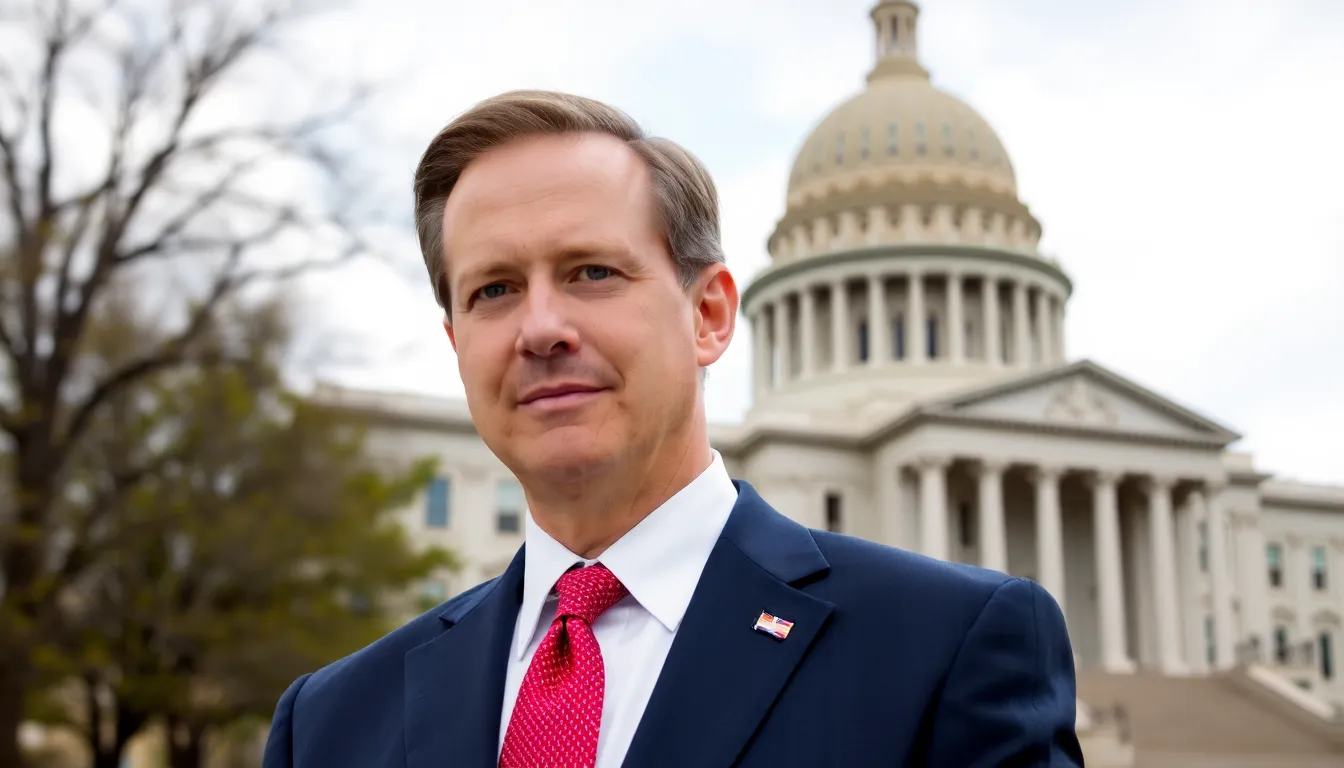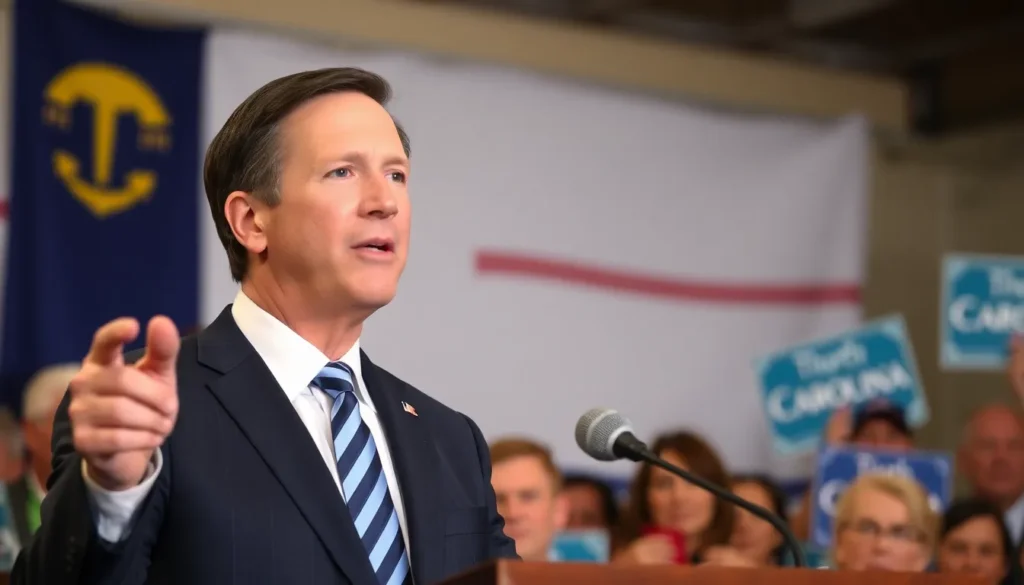As the political landscape heats up, the question on everyone’s lips is whether Thom Tillis will throw his hat back in the ring for reelection. With his track record and a few eyebrow-raising moments, he’s certainly made a name for himself in North Carolina. But will he be back to charm voters with his signature blend of policy and personality?
Overview of Thom Tillis
Thom Tillis remains a significant figure in North Carolina politics. His career has shaped state policies and conversations around critical issues.
Background and Political Career
Thom Tillis served in the North Carolina House of Representatives from 2007 to 2015. He then became the Speaker of the House, focusing on budget reforms and tax policies. In 2014, he won election to the U.S. Senate, defeating incumbent Kay Hagan. Tillis emphasized economic growth and job creation during his campaign, aligning with conservative values. As a senator, he played key roles in legislation addressing healthcare, veterans’ affairs, and immigration. His tenure reflects a blend of advocacy for traditional Republican values and bipartisanship when necessary.
Current Position and Influence
Currently, Thom Tillis holds a prominent position in the U.S. Senate, serving on several crucial committees, including the Armed Services and Judiciary Committees. His influence extends to national security and judicial appointments, contributing to the shaping of critical policies. Strong relationships with fellow lawmakers enhance his ability to push legislation forward. Engagement with North Carolina constituents helps maintain his relevance in state politics. Through his platform, Tillis addresses pressing issues, such as infrastructure and economic development, while navigating the complexities of bipartisan collaboration.
Reelection Campaign Status

Thom Tillis’s reelection campaign status remains a crucial topic in North Carolina politics. While no formal announcements have emerged, speculation continues to circulate regarding his intentions.
Official Announcements
Currently, Tillis hasn’t made any official announcements about running for reelection in 2026. His team indicates that the focus remains on his present work in the Senate. Followers anticipate clarity in the upcoming months as elections draw nearer. Party insiders expect that announcements might align with strategic moments to maximize impact.
Speculations and Rumors
Rumors regarding Tillis’s reelection plans persist among political analysts. Some suggest he could leverage his committee positions to solidify support. Concerns about voter sentiment also fuel discussions about potential candidacies from other personalities. Observers often see these speculations reflecting both his current standing and the changing political climate in North Carolina. Analysts note that Tillis’s unique electoral approach may influence his decision-making process moving forward.
Factors Influencing Reelection
Thom Tillis’s decision regarding reelection hinges on several critical factors. Public opinion and approval ratings shape his political landscape significantly.
Public Opinion and Approval Ratings
Polling indicates varied voter sentiment toward Tillis’s potential candidacy. Approval ratings fluctuated throughout his tenure, reflecting both support and criticism of his policies. Recent surveys suggest that approximately 48% of North Carolina voters view his performance favorably. Analyzing these numbers reveals how pivotal public perception plays in his reelection strategy. Tillis’s ability to resonate with constituents regarding pressing issues influences how they perceive him, suggesting ongoing engagement will be essential. Addressing voter concerns may help maintain or improve these ratings leading up to the election.
Key Issues and Campaign Strategies
Economic growth remains a primary focus of Tillis’s agenda. Job creation initiatives feature prominently in his campaign strategies, appealing to constituents’ desire for stability and prosperity. Infrastructure upgrades also occupy a significant role in his discussions, showing his commitment to improving North Carolina’s conditions. Collaborating across party lines might bolster his approach, as bipartisan efforts often attract broader support among voters. Messaging that aligns with local priorities can further enhance his appeal. Analyzing potential challengers allows Tillis’s team to adapt their strategies effectively, ensuring they remain competitive in the evolving political landscape.
Potential Opponents
Thom Tillis faces several potential opponents as he considers a reelection bid. Various factors may influence the race, including party dynamics and voter sentiment.
Republican Rivals
Internal competition might arise from within the Republican Party. Some potential challengers include prominent state politicians who seek to differentiate themselves. Candidates like Lt. Gov. Mark Robinson and U.S. Rep. Patrick McHenry hold significant visibility and support. Robinson’s rising popularity, particularly among conservative voters, poses a potential threat to Tillis. McHenry’s established political network and legislative achievements could also attract support. The Republican primaries could become contentious as these figures leverage their platforms and connections to mount a serious challenge.
Democratic Challenges
Democratic contenders also loom as potential threats in the upcoming election. Names like former Rev. William Barber and State Senator Natalie Murdock have emerged, garnering attention in early discussions. Barber’s grassroots activism resonates with many voters, focusing on social justice and economic inequality. Murdock’s advocacy for progressive issues might attract younger voters seeking change. Campaign strategies from these candidates aim to capitalize on any perceived vulnerability in Tillis’s record, especially around key issues like healthcare and education.
Impact of Reelection on North Carolina
Thom Tillis’s reelection could significantly influence North Carolina’s political landscape. Voter sentiment and emerging challengers may define the direction of state policies.
Economic Implications
Economic growth stands central to Tillis’s campaign. Promoting job creation, he seeks to address constituents’ needs more effectively. Recent polling shows that 48% of voters appreciate his economic initiatives, a crucial metric for his reelection strategy. Infrastructure enhancement also ranks high on the agenda. Improved transportation and local projects could lead to increased investment and job opportunities. Maintaining a positive economic trajectory would appeal to voters across party lines, further solidifying his position in the upcoming election.
Legislative Agenda
Tillis’s legislative agenda emphasizes bipartisan collaboration. His committee roles in national security and judicial appointments impact various issues, ensuring relevance in discussions surrounding economic growth. Key legislative priorities, including healthcare and education, shape his ongoing outreach efforts. Engaging with constituents enables him to understand their needs better. Addressing concerns can either strengthen his approval ratings or present challenges. Strong relationships with fellow lawmakers might facilitate the passage of significant legislation, reinforcing his leadership position. Adapting his agenda to current voter priorities becomes essential in the face of potential challengers.
Thom Tillis’s potential reelection bid is shaping up to be a pivotal moment in North Carolina politics. With his focus on economic growth and job creation resonating with many voters, he remains a significant figure in the Senate. As he navigates the challenges posed by both Republican and Democratic challengers, his ability to engage with constituents and adapt to their concerns will be vital.
The coming months will likely bring clarity regarding his intentions for 2026. Voter sentiment and approval ratings will play crucial roles in his strategy moving forward. As Tillis weighs his options, the evolving political landscape in North Carolina promises to keep both supporters and opponents on their toes.





